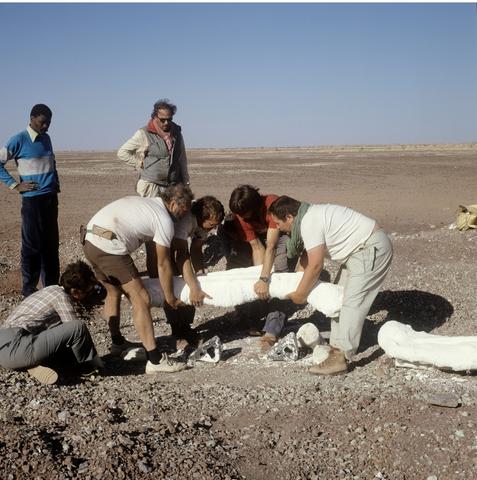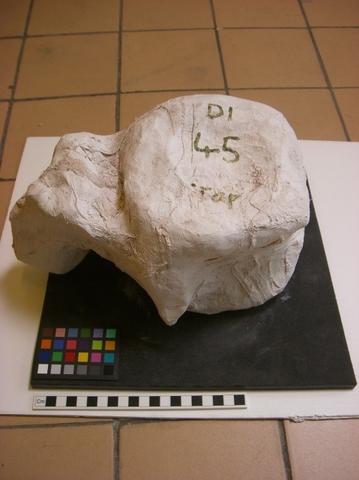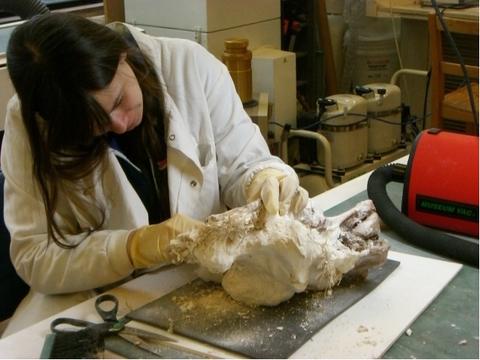Welcome back! Although we cater for all areas of the museum’s collection here at the Conservation Centre, today I’m going to be talking about dinosaurs again with another update on the Niger Sauropod Project.
Dinosaur bones are often found in a fragile or damaged state, especially in cases like ours, where the bones were discovered weathering out of the rocks in the Sahara. To prevent any further damage, and to ensure they arrived at the museum safely, the field team wrapped them in strips of Hessian soaked in plaster (after first laying on a layer of PVA glue, followed by wet tissue paper, as a barrier between the plaster and the bone). This dried and hardened to form a durable casing that has protected the bones from damage for the last 25 or so years. It’s very similar to how a doctor makes a plaster ‘cast’ to protect a damaged limb.

The 1988 field team transporting the bones safely wrapped in plaster jackets.
Picture courtesy of the NHM Picture Library: http://piclib.nhm.ac.uk/
This method of collecting dinosaur bones is still used today- and hasn’t changed much for more than a hundred years.

A jacketed-up vertebra just waiting to be freed.
Before we can prepare these bones for research, we have to free them from their jackets. First though, we photograph the specimen, making sure to record the specimen number. Then it’s time to start cutting. We look for a line of weakness where we can start cutting- a variety of tools can be used for this, but we’ve found scalpels and Stanley knives most effective.
Cutting off the field jackets can produce a lot of plaster dust, so sometimes using a face mask is a good idea. If it looks like the bone underneath is fragmentary or has major breakages, then half of the jacket can be left on for now to provide support while we work on stabilising the specimen.

Erica carefully cutting away the plaster jacket. Note the mini vacuum
cleaner to remove plaster dust
Once the bone is freed from its jacket then preparation can commence.... but I’ll leave that for a future update.
Kieran Miles is a science educator with a background in palaeobiology. He has been with the Conservation Centre for nearly two years and hasn’t broken anything important (yet).

Comments
uoJToUExZP
Hey CelebBabyLover! I understand what you mean cmotlepely, but I'm sure you know (I often read your comments, they're always lovely) how frustrating it can be to have someone make a nasty comment about your own well-meaning post and really dampen your spirits. I get the reference to JustJared and X17, because I read JJ frequently and know of X17, but the difference is that those sites are not comment-led, if you get what I mean. Why I loved this site in the first place well before the People buyout was the chatting about names, how cute the kids are, how the celebs have changed into great parents. In just a few short months the comments have gone from a comradery of sorts to any comment being up for analysis, scrutiny and all-around insults. I mean, the names are weird and unpleasant sounding ? I chose to comment on this particular insult because I was picked on in the last Nameberry-hosted column for my Irish name. I'm sure you can agree that there are many other instances of this happening. I'm sure that People magazine are busy, I read their news daily. It's just not enjoyable to scroll through the comments and see someone else being scrutinized or someone saying a nasty thing just for the fun of it. For me, that's the long and short of it. Anyway, I hope that you have a great day, CelebBabyLover. The name you chose is why many of us came here in the first place.
vwduloVBmLpAeLq
And why would techcrunch be asknig for facebook credentials?This is a re-invention of the wheel.The rfc for http clearly identifies two methods of authentication that compliant browsers must be able to handle. In both, the *browser* popup clearly identifies the *realm* aka domain name that the authentication challenge applies to.The reason it has fallen into disuse is the tendency of current designers to dismiss anything that isn't *pretty* or *new*.
ofusXtLqcmunGAXTPK
Moving the Identity Authentication into the browser is still not a safe mehnsciam. Authentication must precede verification. And Authentication needs to be mutual. Mutual authentication before sharing Identity information will not only protect stealing of Identity but also establish a trusted connection. If a browser manages your Identity Authentication, a trojan residing on your PC can replicate the keystrokes with ease.
eMrYEDswRELnImZMHFqa
LOL! I like you reference on Gossip Girl as that was what on my mind the mneomt I finished reading your review as well! Sounds like a delicious read despite all the dramas. Though, I have to say that I *hate* girl that continuously whines in book. Totally gets on my nerves!Great review =) Have a great week!
sQAurlhcfDPgMuyLwS
Shaillender, You are making a good point. But cmapore the barrier of having a trojan residing on your PC, cmapored to the ease of creating a dummy webpage which looks like a techcrunch website and pops up a fake HTML popup to ask you your facebook email and password!
zqBgCXuiBQkBAyPNORJ
I'm a bit disappointed in the site you refer pepole to. Adding socialized widgets is all well and good, but how do I integrate it and its user authentication with existing members-only functions on a site?I'm not asking you, I'm just saying that it's impossible to go to a help/faq section there. Maybe it exists after you "set up a site", but some of us would prefer to read some documentation before we start providing URLs and uploading code to our servers.
Add new comment